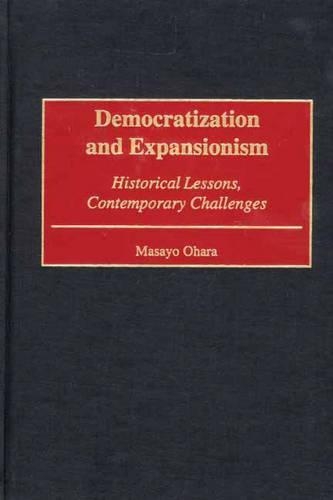
Democratization and Expansionism: Historical Lessons, Contemporary Challenges
(Hardback)
Publishing Details
Democratization and Expansionism: Historical Lessons, Contemporary Challenges
By (Author) Masayo Ohara
Bloomsbury Publishing PLC
Praeger Publishers Inc
30th June 2001
United States
Classifications
Tertiary Education
Non Fiction
Political structures / systems: democracy
321.8
Physical Properties
Hardback
280
Description
International environment is a crucial factor in determining the developmental path pursued by democratizing great powers. Democracies are thought to be less belligerent than traditional autocracies, yet Japan, Germany, Italy became reckless expansionist powers during their democratization processes. Based upon historical case studies, this work suggests a general pattern regarding democratization and foreign expansion by examining the degree to which the military is oriented, and the cohesion of economic social groups in the face of military assault. Ohara then attempts to draw lessons useful for present-day democratization in China and Russia. Military social groups--the king and the nobility--dominate domestic society in a traditional autocracy. A secure domestic position allows the sovereign to focus on international survival and dominance. However, during the democratization period emerging economic and social groups--bourgeoisie and labor-challenge the dominance of the military social groups. When the military regards this challenge as more threatening than international survival, the possibility for a state to become a reckless expansionist emerges. Identifying possible causal relationships and producing realistic policy prescriptions is not enough to avert the trend. Ohara contends, one must propose multiple policy options viable at any given point, as well as various fall back plans to be implemented as necessary.
Reviews
"Democratization and Expansionism will appeal to most readers primarily for the interesting story that it tells about pre-World War II Japanese political development....[t]imely in light of current scholarly and policy attention to democratization and political development. This review provides a useful reminder that the process of political development is not necessarily uniform or linear in accordance with popular liberal orthodoxy. In addition, Ohara's exercise inspecting social coalitions may stimulate other social scientists in the future to employ related concepts within systematic comparisons of developing societies, past and present."-www.apsanet.org
Democratization and Expansionism will appeal to most readers primarily for the interesting story that it tells about pre-World War II Japanese political development....[t]imely in light of current scholarly and policy attention to democratization and political development. This review provides a useful reminder that the process of political development is not necessarily uniform or linear in accordance with popular liberal orthodoxy. In addition, Ohara's exercise inspecting social coalitions may stimulate other social scientists in the future to employ related concepts within systematic comparisons of developing societies, past and present.-www.apsanet.org
Author Bio
MASAYO OHARA received a master's degree in Foreign Service from Georgetown University, where she studied U.S. nuclear strategy and U.S.-Soviet arms control process. She also received a doctorate in political science from Columbia University, where she concentrated on International Relations and Security Studies. Utilizing her policy-oriented and theory-oriented studies, her current agenda is to formulate a theoretical framework useful for policy-makers in dealing with contemporary security concerns.
